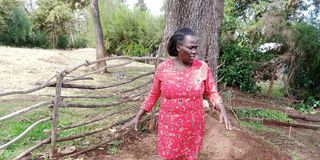Innovations helping small-scale operators cut greenhouse gas emissions

Ms Lucy Wanjiru Gitegi from Ngenia, Laikipia North, at her tomato fruit nursery. Farmers in the area have adopted conservation agriculture to increase their yields.
What you need to know:
- They are switching to low carbon energy sources during industrial, commercial and farmland activities, which reduces emissions and captures and stores carbon in soil and vegetation.
- This is achieved by methods that utilise clean energy resources, reduce production and residual wastage, minimise pollution and mitigate environmental impacts.
Small-scale operators in manufacturing, agro-processing and farming are opting for climate-friendly innovations that reduce greenhouse gas emissions in the atmosphere because they have direct benefits to their economic needs.
The operators are applying simple techniques that experts in environmental conservation say are helping in decarbonisation - activities that reduce or eliminate carbon dioxide and methane emissions in the atmosphere, improving climate change resilience and mitigation.
Ms Andrea Meza, deputy executive secretary at the United Nations Convention to Combat Desertification (UNCCD), says simply put, decarbonisation refers to modern alternative ways of living and working collectively aimed at protecting the environment from further global warming. This is mainly through switching to low carbon energy sources during industrial, commercial and farmland activities, which reduces emissions and captures and stores carbon in soil and vegetation. This is achieved by methods that utilise clean energy resources, reduce production and residual wastage, minimise pollution and mitigate environmental impacts.
For example, a retail distributor who invests in electrification efficiency and renewable energy in a warehouses ends up reducing dependence on fossil fuels.
Ms Meza, a sustainable development expert, says for this to happen across board, it will require radical changes in our current economic models, which mostly focus on growth at all cost.
Economically speaking, decarbonisation strategies are holding the key to a reduced energy cost, improved extreme weather resilience and decreased power outages, which get more frequent with climate change.
Industrial decarbonisation focuses on ways companies can reduce emissions such as though clean energy use, low carbon fuels and maximising energy utilisation.
Ms Meza notes that since the mid-20th century, greenhouse gases emitted by human activities are the dominant cause of climate change, with agriculture and land use sectors being responsible for one third of the emissions.
The bulk of this is attributable to methane from livestock production, chemical fertilisers such as nitrous oxide and carbon dioxide from the destruction of natural ecosystems.
Low carbon economy
Dr Anderson Kehbila, Africa Programme leader for Natural Resources and Ecosystems at the Stockholm Environment Institute (SEI) Nairobi, explains that moving to a low carbon economy that encourages as much greenhouse gas absorption as is being emitted through production processes such as renewable energy transition, energy conservation, electrification of transportation and carbon capture and storage will assist in climate change mitigation.
He sees innovation in entrepreneurship as a key factor towards low carbon economy transition.
“Across Kenya and the region, we are seeing entrepreneurs, individuals and communities developing local innovations which they are using for renewable and clean energy efficiency. Farmers are coming together to exchange knowledge on conservation agriculture, a critical component in reducing carbon dioxide and methane. These low cost technologies and innovations will go a long way in reducing global warming in the long-term while improving air quality,” explains Dr Kehbila.
In terms of continental leadership, to achieve large scale energy transformation, there is need for behavioural change in energy efficiency and conservation through adapting renewable energy technologies.
“African governments need to provide space and resources to justify public funding and private sector investment towards achieving a steady transition to low-carbon cooking fuels and usable renewable energy. This ensures conservation of Africa’s forest resources that consequently act as sinks to carbon emissions through forest carbon sequestration,” explains Dr Kehbila.
According to the UNCCD, deforestation accounts for almost nine billion tonnes of carbon dioxide entering the atmosphere every year. Tropical forests are being destroyed at an alarming rate to grow feeds for livestock, and as grazing land.
These changes in land cover account for 14 per cent of carbon emissions and five per cent methane emission. Yet land-based ecosystems could provide 20 to 30 per cent of the mitigation required to ensure global warming stays below 1.5 degrees Celsius towards 2050.
While over USD700 billion Sh98 trillion) is spent every year on agricultural subsidies worldwide, only approximately 15 per cent of this amount has impacted positively to natural capital, biodiversity, long term job stability, and livelihoods.
According to Dr Kehbila, repurposing farm subsidies will encourage commercial farmers to adopt more sustainable climate-friendly food production practices.
This should focus on regenerative agriculture, which increases health benefits to consumers, enhances soil carbon storage and protects biodiversity.
“These practices protect soil structure, conserve moisture, suppress weeds and pests, and can create new carbon sinks over longer time. For example, conservation or no-till agriculture increases biomass and soil organic carbon as well as nutrient and water availability through agronomic and other resource-conserving practices. Many smaller scale farmers have already adopted sustainable farming methods focused on soil health,” adds Dr Kehbila.
Michael Njung’e, 24, a farmer from Limuru, Kiambu County, states that lack of government support in modern conservation agriculture is driving many small holder farmers to employ their own knowledge in improving farming methods. “We have decided to be our own experts since many of us cannot afford agronomists to advice on conservation agriculture. Exchanging knowledge among ourselves is paying off as we have seen our soils improve and my potato yields get better every year,” he explains. In conclusion, Ms Meza calls on governments to support communities in adopting climate-friendly diets, “which in turn will contribute to the growth of local organic farming sector, ensuring generational food and nutritional security, while caring for our precious soils”.




